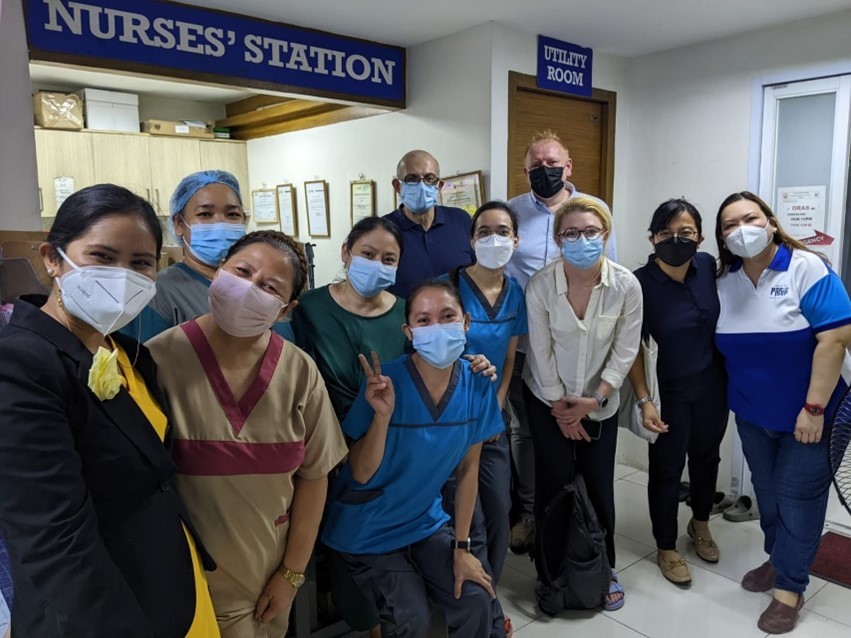
It is easy for those of us in the UK to think of heart disease, diabetes and cancer as being problems isolated to Europe and North America, but the reality is there is a growing burden of chronic diseases everywhere in the world.
Also known as non-communicable diseases (NCDs), the prevalence of these chronic diseases is increasing and is rapidly overtaking the impact of diseases such as malaria and tuberculosis more commonly perceived to be associated with health systems in low and middle-income countries. Indeed, WHO attribute 74% of all deaths worldwide to NCDs. NCDs tend to be of long duration and are the result of a combination of genetic, physiological, environmental, and behavioural factors.
NCDs account for 68% of all deaths in the Philippines. The Government of the Philippines is committed to tackling NCDs and has made progress with tobacco control, alcohol taxation, and food labelling. The Philippines Department of Health has committed to implementing universal health coverage across the country.
As part of our ongoing global work, for the past 3 years TEL has been collaborating with colleagues in the Philippines. Collectively, we have drawn on TEL’s experience in workforce learning and digital literacy to develop a set of learning interventions with the team in the Philippines. The Philippines is one of the Better Health Programme (BHP) countries collaborating with the UK, largely through the NHS Consortium for Global Health (NHSC).
The BHP, funded by the UK’s Foreign, Commonwealth and Development Office, is a 3-year programme seeking to improve health outcomes through technical collaboration in 8 partner countries (Brazil, Mexico, South Africa, Malaysia, Myanmar, Philippines, Thailand and Vietnam). The overall aim is to strengthen health systems, specifically by addressing the burden of NCDs and increasing access to safer, quality health care.
With a population of 113 million located across more than 7,000 islands, geography plays a significant role in tackling NCDs at a country level in the Philippines, meaning most health services are coordinated at a city or regional level. Alongside a colleague from NHS Digital, the team at the NHS Consortium, and in-country delivery partner FHI360 and PwC, we worked with health colleagues in 2 regions: Pasig City in Manila (an urban area) and Iloilo City in the Western Visayas region (a more rural area). We worked together to co-design systems for monitoring the prevalence of NCDs; to educate the workforce in the digital skills necessary to use IT systems; and elearning to educate health workers in prevention of NCDs.

The pandemic of course presented challenges to the implementation of the programme as tackling COVID-19 took precedence over any other work and prevented travel, meaning that collaboration on the programme was conducted remotely rather than in-person. However, our partnership with the British Embassy Manila aided smooth facilitation with local teams in the Philippines. While the virtual nature of working throughout lockdown in the UK and the Philippines was challenging, including managing the 7-hour time zone difference, all stakeholders maintained their dedication and enthusiasm to work through these challenges and ensure the success of the project.
After three years of working virtually, when the opportunity to physically meet the Philippines team presented, it was a huge privilege and honour to be invited and to co-present our work and learn about the experiences of our peers. The visit was part of a series of closing events for the BHP programmes in Southeast Asia, designed to celebrate the successes and to build stronger connections and identify future opportunities for collaboration.
It was clear from the discussions that the programme will have a lasting impact on the delivery of education in the Philippines. Similarly, there will be an impact on clinical practice in the UK, such as developing new ways of presenting NCD information in elearning.
As with all Global work, success is built upon personal relationships. The programme was successful at educating more than 1000 health workers in NCDs, but the final visit to close out the programme reinforced these bonds, forging new friendships and identifying new opportunities for collaboration in the future.


References
WHO (2022) Noncommunicable diseases. Available from: https://www.who.int/news-room/fact-sheets/detail/noncommunicable-diseases
WHO (2019) Investment in noncommunicable diseases prevention and control will save lives and contribute to the Philippines saving up to 4.8% of annual GDP. Available from: https://www.who.int/philippines/news/detail/29-10-2019-investment-in-noncommunicable-diseases-prevention-and-control-will-save-lives-and-contribute-to-the-philippines-saving-up-to-4.8-of-annual-gdp